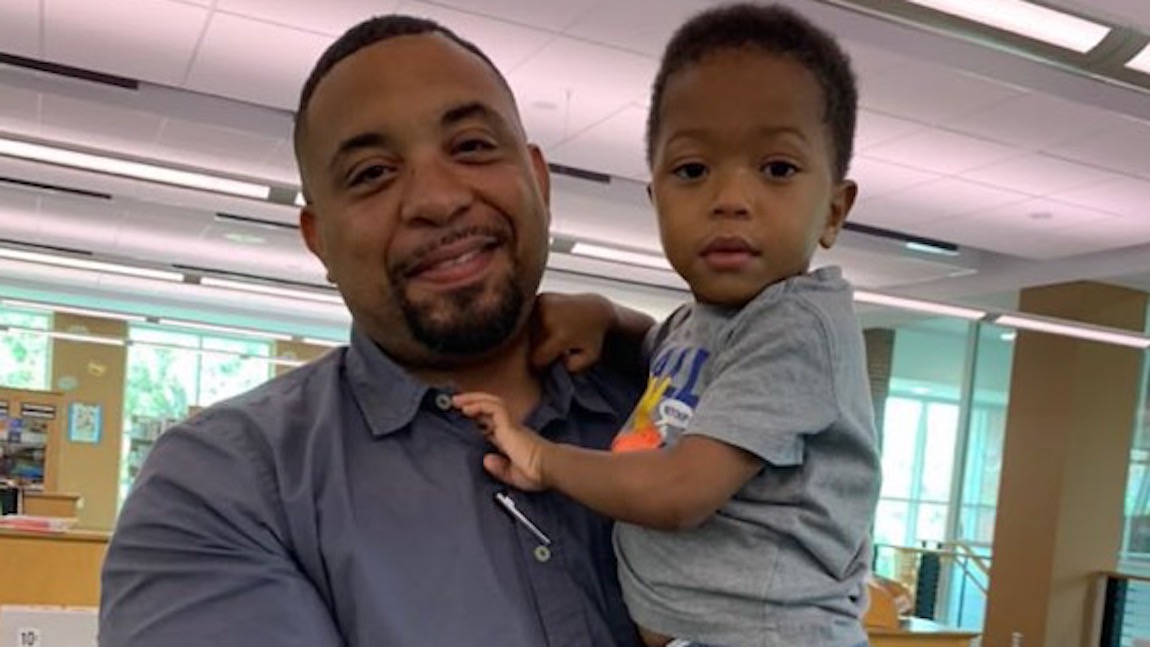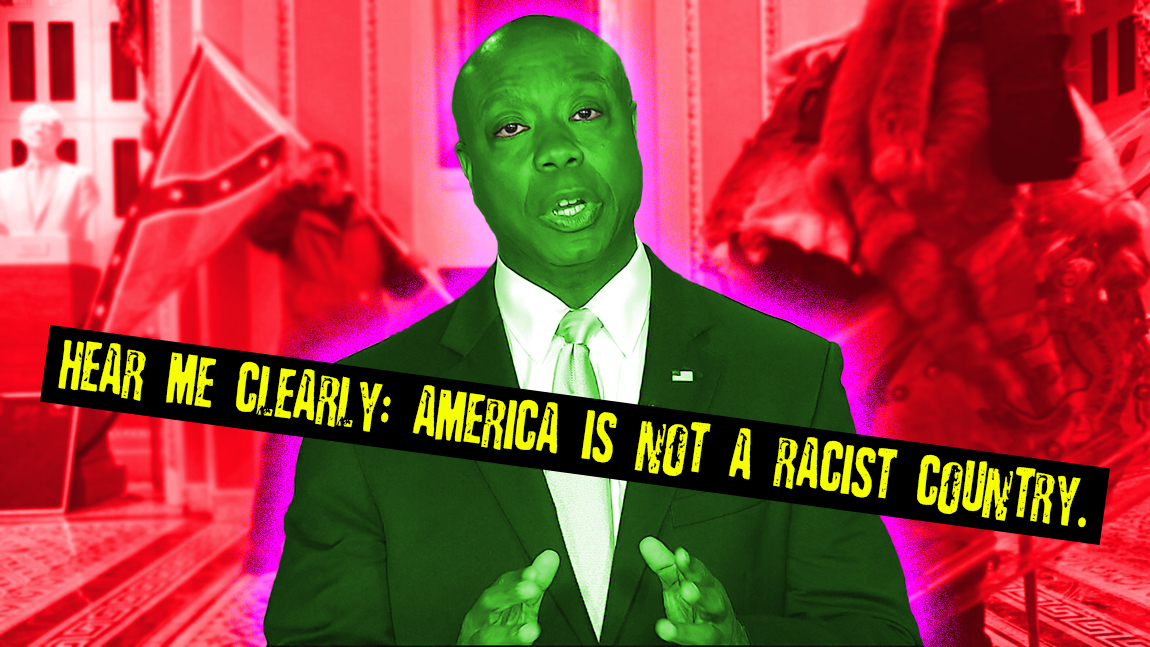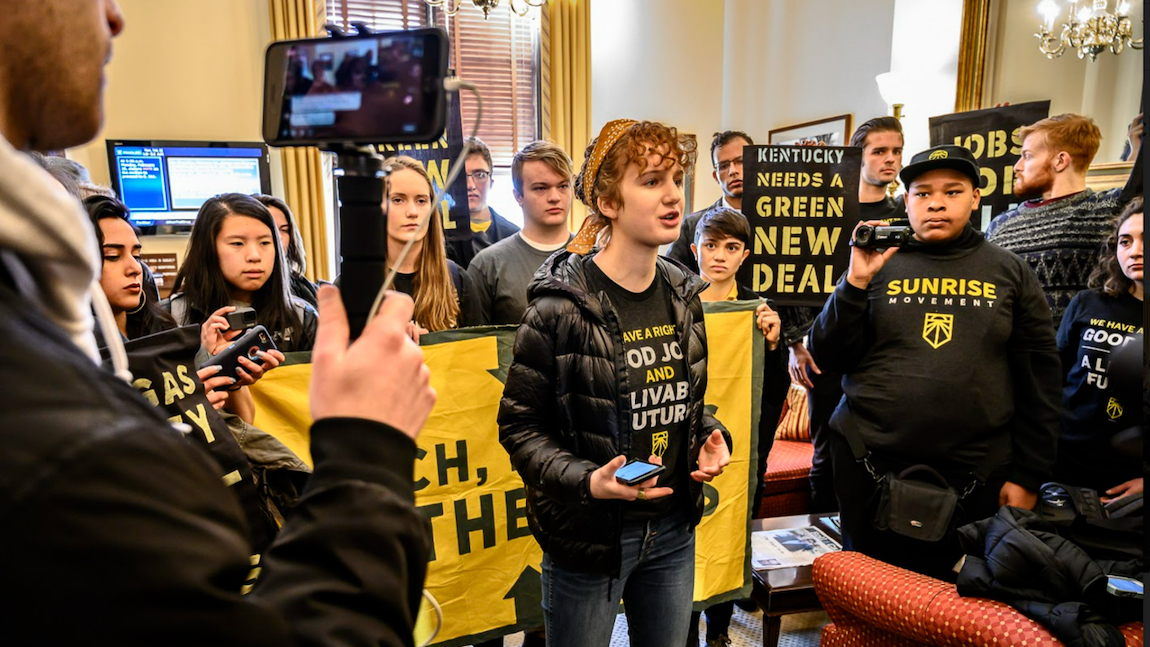Above Photo: The author is shown with his son, Khalil Gabriel Fowler, to whom this article is dedicated.
By Dameion Fowler
We have been sold a proverbial “bill of goods” when it comes to the intellectual development of our black children.
We have been told that our children are the same as white children, but with darker skin. And thus, we believe that true, quality education means that our children are taught the exact same thing as white – and in the exact same way.
School districts like Horry County Schools have consistently assumed that the learning styles of the white, middle-class child are universal and apply to all children regardless of cultural/ historical development and background. Thus, all children in Horry County Schools are taught using pedagogical standards only meant for white children, and when many of our children do not learn, they are categorized as “deviant”, “learning disabled” and in need of some type of remedial or special education.
The result is that our black children are being shortchanged and their futures are being placed in jeopardy.
According to documents obtained from HCS through the Freedom of Information Act, as of October 25, 2016, in a school district comprised of 20 percent black students, 30.4 percent of the students labeled as having disabilities are black.
I am not against the concept of “special education”. We are quite aware that there are children who are helped immensely by their placement in special education classes. However, we must ask these questions:
- How many black students have been labeled as “learning disabled” when the real problem is a “disability in teaching”?
- How many of our children have been dismissed as unable to learn in a general education classroom, not because they cannot learn but because the teacher is unable to teach that child using a pedagogy geared toward that child’s cultural development?
Fighting Myths, Racism
In the book, Young, Gifted, and Black: Promoting High Achievement Among African-American Students, Dr. Asa Hilliard, the late educational scholar, documented numerous instances in which black children labeled as disabled and uneducable are able to excel in the classroom because of the excellent teaching abilities of black teachers who refused to accept the labels placed on those children by the educational establishment.
Unfortunately, questions about learning styles based on culture dredge up in many black people the awful myths and theories associated with segregated education: Myths of the intellectual inferiority of black people when compared to white people that were used to justify black children learning in separate (and inferior) conditions.
Many leaders use the horrendous reality of segregated schooling and the impact it had/ has on black children to push and insist on the equally absurd myth that equal education exists when black children learn the same EXACT way that white children learn.
In the book, Black Children: Their Roots, Culture, and Learning Styles, Dr. Janice E. Hale, educational researcher and founder of the Institute for the Study of African-American Children, warns us that:
If we do not offer our own definitions of aptitude, intelligence, and achievement within the context of African and African-American culture, the majority of our children will have to continue to struggle through special classes, educable mentally retarded labels, SAT, and GRE scores to “make it” in society.
The fact of the matter is: we do our children a severe disservice when we place the responsibility to educate them in the hands of teachers and administrators who have no idea how to teach them.
Intellectual Ability
The teachers of the Horry County School district do not know how to teach black children because they were never taught how to do so. They were never taught how to do so because many of the colleges these teachers attended have an entire body of knowledge and research that doesn’t even consider the black child as unique in any way, but, to quote Amos Wilson, merely a “white child with dark skin”.
The research shows that black children are second to none when it comes to intellectual ability and the main reason that this brilliance does not manifest itself in the classroom is due to the fact that they are not taught based on their developmental psychology.
Research found in the Journal of Genetic Psychology established decades ago that, in studying and comparing the development of psycho-motor skills in black and white infants, black infants are generally superior to white infants.
In his pioneering book, The Developmental Psychology of the Black Child, psychologist Dr. Amos N. Wilson provides a list of developmental achievements and ages in which black children achieve them compared to white children:
- Nine hours old being drawn up in a sitting position, able to prevent his head from falling back. (White child: 6 weeks)
- Two days old, with head held firmly looking in the face of an examiner. (White child: 8 weeks)
- Seven weeks old, supporting herself in a sitting position and watching her reflection in a mirror. (White child: 20 weeks)
- Five months old holding herself upright. (White child: 9 months)
- Five months old, taking a round block out of its hole in the form board. (White child: 11 months)
- Five months old, standing against a mirror. (White child: 9 months)
- Seven months old, walking to Gesell Box to look inside. (White child: 15 months)
- Eleven months old, climbing steps alone. (White child: 15 months)
The research shows that black children develop their sensory-motor skills at earlier stages than white children and maintain an advanced development over white children until three to five years of age. In the book, Awakening the Natural Genius of Black Children, Dr. Amos N. Wilson explains:
Black children are psycho-motorically ahead of white children until they get to about age three. The major reason why they start falling behind at ages 3-5 is because their way of dealing with the world shifts. Up to about 2 to 3 years of age, the major way of dealing with the world is to deal with it concretely: through the ability to handle objects and to coordinate the body and psycho- physical systems. But around the age of three, the way of dealing with the world is increasingly by the word, and it is at that point that our children begin to slip because they do not use words and language as proficiently as they should.
Dr. Wilson’s description of what happens for black children at the age of three is very important. Teaching and educating black children must begin at extremely early stages not only to accommodate their immense brain power, but to also facilitate a smooth transition for the child from handling and learning the world concretely to handling and learning the world through words and symbols. Dr. Wilson goes on to cite a testimony, by Chilton Pearce, of the work of Marcelle Geber with black infants in Africa:
In 1956, Marcelle Geber, under a research grant from the United Nations Children’s Fund, traveled to Africa to study the effects of malnutrition and infant and child intelligence and made a momentous discovery: She found the most precocious, brilliant, and advanced infants and children ever observed anywhere… Sensorimotor learning and development were phenomenal, indeed miraculous. A superior intellectual development held for the first four years of life… [The black infants’] preciosity was not only in motor development, it was found in intellectual development also.
Additionally, in the book Infant Culture, Drs. Jackson and Jackson found that,”…overall, the greatest preciosity has been found in black infants, both in Africa and in the United States…”
This precocity that the researchers write of becomes quite apparent when black children are taught from a pedagogical standpoint that is rooted in African/Black cultural and historical development. The journal of the American Educational Research Association, Educational Researcher, published the following in its June 2016 edition:
There is also a substantial and growing body of research demonstrating that a strong black identity is linked to improved educational outcomes and higher academic achievement. Black youth with a strong, positive racial identity place more importance on academic goals and career aspirations; are more likely to embrace education as a means of “getting ahead”; demonstrate greater enjoyment of and effort expended in the service of academic goals; and demonstrate higher levels of performance in academic settings as measured by grades, academic self-efficacy, and test scores. They were also more likely to pursue higher education and show increased investment in academic achievement over time. Again, the opposite is also true: We see poorer educational outcomes when black youth have a weak or negative racial identity.
In Horry, Tolerance & Racism
Having been a substitute teacher in Horry County Schools, I have witnessed the dumbed-down, milquetoast, “vanilla” curriculum and the even weaker methodologies used to teach the curriculum. Black children are expected to learn from a majority white teaching staff, many of whom are, at best, tolerant of black children or, at worst, openly racist and hostile to black children.
However, it has become undeniable that black children learn when there is implementation of a pedagogy that is African-centered. One such success story is the acclaimed, all-black, Marcus Garvey School in Los Angeles, CA. Dr. Amos Wilson lists the following achievements of the students at the school:
- Two year olds learn to recite their alphabets in English, Swahili, and Spanish.
- Three year olds can recite the Latin names of all the major bones in the body and can recognize all 50 states on a map, can cite their capitals with minimal assistance from teachers.
- It is common place for four year old preschoolers to read from third to sixth grade books. In fact, Garvey students are usually three or more grade levels above the national grade average in reading and math.
- At Garvey, algebra is taught in fourth grade and trigonometry and calculus taught in early grades.
- Garvey third grade students scored higher on both reading and math than sixth graders from a public school for gifted (predominantly white children) on identical tests administered to both classes.
Dr. Asa Hilliard further testifies:
…Specifically, Marcus Garvey offers a course in Calculus at the fifth grade, something many of us believe is high level achievement in content, in difficulty, and in complexity to students for whom many had predicted even low level arithmetic to be beyond their means…
The incredible intellectual feats achieved by the Garvey children are compounded by:
- The fact that, as a general rule, the teachers are hired based on their willingness to teach children the correct way, not based on what type of degrees they have, and
- The fact that this school accepts all black children, whether they have been labeled as “gifted” by the public school district or not.
I ask this question: Why hasn’t the Horry County School board sent a delegation of teachers and administrators to the Marcus Garvey School, or one of these other great black schools, to learn from proven experts how to intellectually stimulate all black children?
I believe the answer is quite simple: They do not care.
I maintain that the school district simply does not hold the adequate education of black children as a high priority.
How else can they explain their complete silence in the face of the terrible shortage of black teachers with no plan to increase the numbers?
How else can they explain the disproportionate rates of black children being suspended and/or expelled?
How else can they explain the fact that one of the largest concentrations of the black student minority is at the alternative school?
How else can they explain the high percentages of black students failing “End of Course Tests”?
I maintain that these educational administrators, the senior representatives in the school district, and the school board do not care about our children.
With the acceptance of this reality, black parents and all people of good conscience must take up the mission of ensuring the education of our children with more fervor, ambition, and vigilance than ever before.
We must not tolerate the school district’s attempts to throw our children under the bus in the name of some horrific “academic ethnic cleansing”. Our babies are second to none in ability and brilliance, and only when we set high standards for them, and ourselves, will we then see that brilliance shine through.






